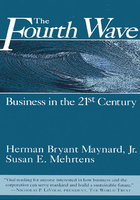
Foreword
IF EVER THE CHINESE CURSE, “May you live in interesting times,” has been true, it is during this time of transition for the world. The old tried and true ways are just not working anymore. It seems that when we solve one problem it comes back in a different form, and, what is more, five other problems pop up to take its place.
Technologies that have bettered the lives of a certain proportion of the world’s people have emerged from what this book calls the “Second Wave,” but they have also led to terrible side effects: three to four hundred species become extinct every day, the destruction of the rain forests is proceeding at a rate that is unthinkable, holes in the ozone layer grow at a rate double the worst predictions, thousands die of starvation every day, and population growth is out of control and exceeds the ability of the planet to support it. Despite all of these dire results of our materialist, growth-oriented system, people in underdeveloped countries around the world say they want the same kind of culture. So the destructive forces feed on themselves. As African scholar and educator Mtombe Mpana puts it, “The American dream has become the world’s nightmare.”
People in business who get caught in the difficulties of today get into a hopeless state. It is not only that there are societal and global problems. There are difficulties of stress, frustration, anger, fear, and hopelessness at the individual level—coupled with the inner feeling that there is something better, that there is something great for each of us and the planet, and that there is a contribution we can make to getting there. We cannot seem to get a view at a higher level so that we can see the pattern in the seeming contradictions and chaotic events.
Herman Maynard and Susan Mehrtens give us this kind of perspective and more. Like all great creative works, The Fourth Wave represents a synergy between seemingly incongruous elements. The authors combine deep corporate and entrepreneurial business experience with a sweeping scholarship in all the disciplines needed to understand the nature of business now and in the future. They hold the hope of what business can be while being brutally realistic about the difficulties experienced today in making the transition. They frame exciting concepts with facts about actual changes and anecdotes about what has happened in corporate settings as businesspeople go through this time of sometimes terrifying change.
I cannot think of a better way to communicate the beauty of this book than to characterize its message as being a heuristic, perhaps a meta-heuristic or a system of heuristics. The typical dictionary definition of the word heuristic is that it is a “generalization or rule of thumb for learning or discovery.” It contrasts with algorithm, which is a rigid rote law or formula for doing something. Heuristic has the same Greek root as the word eureka, which implies the thrill and energy of the moment of creativity. With their story of the transition from the Second Wave to the Third Wave and ultimately to the full effect of the Fourth Wave in the next century, the authors give us many eureka moments, both in the course of reading this book and in the implementation of its ideas. This book’s heuristic grounds us in the current realities while showing us a process that will move our work, business, and personal lives into the twenty-first century in a way that is right for each of us and for the planet.
Instead of constricting us like a formula, the heuristic of the Second, Third, and Fourth Waves provides a context within which to turn our difficulties into challenges that we can face with a new faith. Unless we have faith that springs from a deep inner vision for our actions, we will not be able to persist during these difficult times. This book shows us the structure of change so that we know that even setbacks are part of an inevitable process that is leading to a new and better world.
At the same time, Maynard and Mehrtens do not fool us into a complacency, into waiting for this new world to come. They realize that for a variety of reasons, primarily psychological, we find it painful to consider the difficulties of a world in transition and that often the whole subject is avoided as a result. To counteract this, they show us a way to take responsibility with creativity, compassion, and community. They exhort us to live in these times with a vision of what business and the world is and can be that is richer and more textured than anything I have seen written.
Reading this book is like having a wise friend who has gone through the difficulties and opportunities of our time in business and who will take time with great care to make sure that you understand the situation, the process we are going through, and what needs to be done. For some of us, this book lets us know that we are not crazy, that the changes are inevitable, and that we each have a choice as to whether we are going to go through this period into the next century with pain or with exultation. To choose exultation, read and act on this book. Then the old Chinese curse will become a blessing for you.
Michael Ray
John G. McCoy-Banc One Corporation Professor
of Creativity and Innovation and of Marketing,
Graduate School of Business, Stanford University